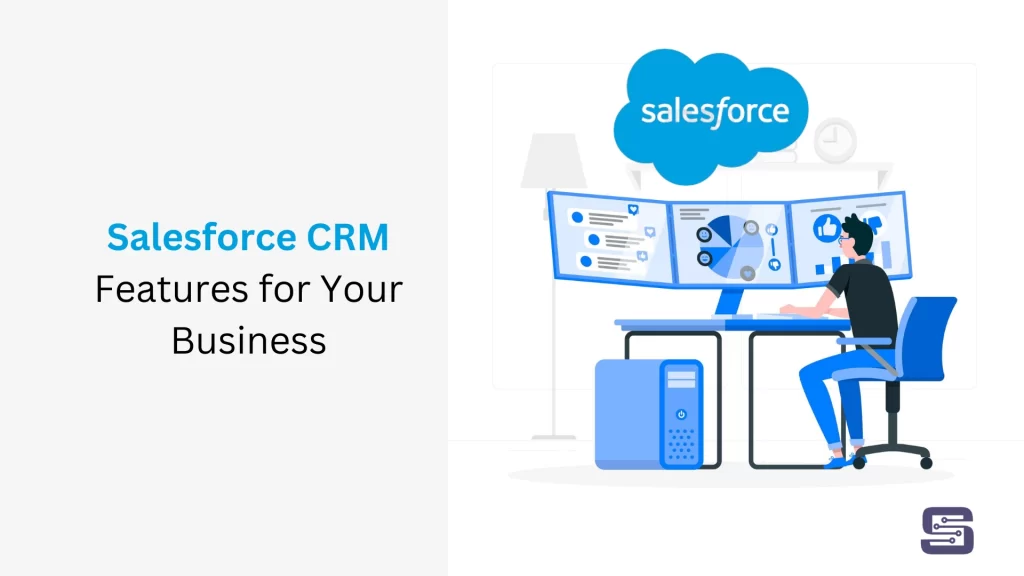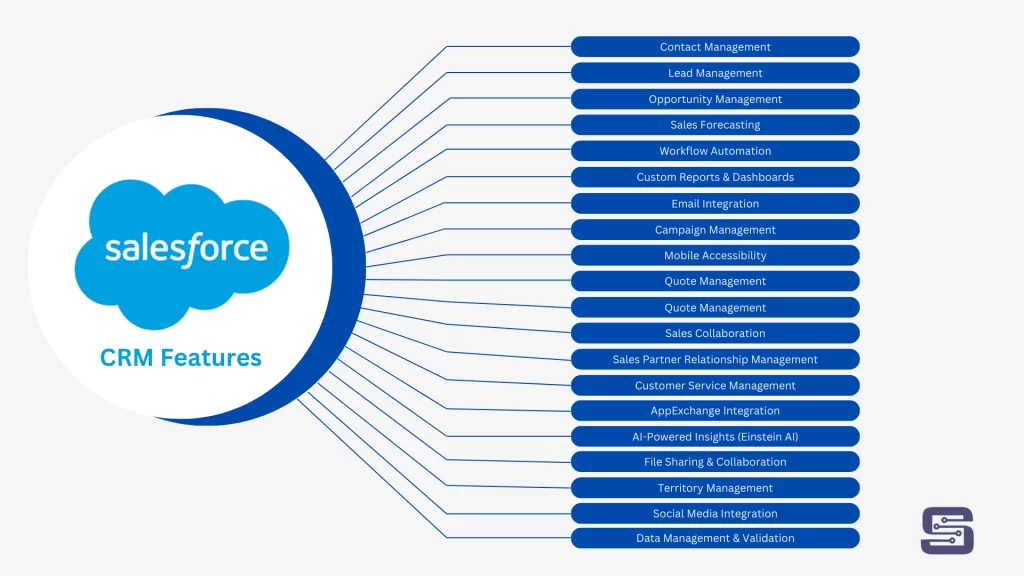
In today’s world, customer relationships are critical to the success of any business. This is where Salesforce CRM comes in, offering companies a comprehensive solution for managing customer relationships, sales pipelines, marketing efforts, and service interactions. For any startup, small business, and other startups, handling customer relationships to increase customer satisfaction will be a key part of the business, Salesforce CRM provides the tools to achieve your business objectives.

What is Salesforce CRM?
Salesforce is a popular platform used by companies to find new customers, make more sales, and provide better service. It uses cloud technology to help businesses stay connected with customers and partners. With Salesforce, companies can track customer activities and run marketing campaigns.
A CRM platform like Salesforce helps businesses understand their data better and create dashboards to display important information. It also allows for personalized customer outreach through automation, making it easier to connect with customers. Additionally, it improves customer service and helps sales teams reach out more effectively.
Salesforce CRM is a cloud-based tool that helps businesses manage their sales, customer service, marketing, and more. It’s flexible and can be customized to fit the unique needs of any company. With Salesforce, businesses can better manage their leads, close deals faster, and improve customer satisfaction.
Salesforce CRM Features:

1. Contact Management:
Contact Management centralizes all customer and prospect information, such as phone numbers, emails, addresses, and social media handles, in one place. It also stores all communication history, so sales and customer service teams can access a 360-degree view of customer interactions. This allows for personalized conversations and improved relationships with clients.
2. Lead Management:
Lead Management helps businesses track leads from the first point of contact to conversion. The system automatically routes leads to the appropriate sales rep, providing insights into the best opportunities to pursue. It enables teams to see which leads are warm and where each lead is in the sales funnel. This results in faster response times and higher conversion rates.
3. Opportunity Management:
Opportunity Management allows sales teams to track deals through every stage, from initial interest to final closing. It provides real-time insights into each opportunity’s progress, helping reps to prioritize high-potential deals. You can also see details like expected revenue, competitors involved, and key players. This ensures nothing is missed and deals move forward efficiently.
4. Sales Forecasting:
Salesforce’s Sales Forecasting feature provides accurate revenue predictions by analyzing historical sales data and current pipeline information. Sales managers can monitor progress towards goals in real-time and adjust strategies as needed. Forecasting tools help ensure that businesses stay on track to meet their financial objectives.
5. Workflow Automation:
Workflow Automation streamlines repetitive tasks like follow-up emails, record updates, and assigning leads or tasks to the right team members. By automating manual processes, teams can focus more on selling and less on administrative tasks. Workflows are customizable and can be tailored to specific business processes, ensuring a smooth and efficient operation.
6. Custom Reports & Dashboards:
Salesforce’s reporting and dashboard capabilities give users the ability to generate in-depth reports on everything from sales performance to customer engagement. Dashboards offer a visual representation of key metrics in real-time, helping teams track performance and make data-driven decisions. Users can customize reports and dashboards to suit their specific needs, offering complete visibility into operations.
7. Email Integration:
Salesforce integrates with popular email services such as Outlook and Gmail, enabling users to send, receive, and log emails directly within the CRM. This helps sales and support teams keep all communication in one place. Emails can be automatically linked to customer records, allowing for complete tracking of all customer interactions.
8. Campaign Management:
The Campaign Management feature allows businesses to plan, execute, and track marketing campaigns across different channels like email, social media, and paid advertising. Salesforce measures the effectiveness of these campaigns in real-time, providing detailed analytics and insights into which strategies are working. Marketers can optimize their efforts based on this data, improving overall campaign ROI.
9. Mobile Accessibility:
Salesforce’s mobile app gives users the freedom to access all CRM data on the go. Whether on a smartphone or tablet, sales and service reps can view customer records, check dashboards, and update information in real-time. This keeps teams connected and responsive, even when they are away from the office.
10. Quote Management:
Quote Management simplifies the process of generating quotes for potential clients. Sales reps can easily pull product and pricing information from the CRM and generate accurate quotes, including custom discounts. This feature ensures that quotes are standardized and can be shared quickly with customers, speeding up the sales process.
11. Sales Collaboration:
Salesforce’s collaboration tool, Chatter, allows teams to communicate and collaborate directly within the CRM. Sales reps can discuss deals, share insights, and ask for help from other departments. Chatter keeps everyone in the loop and fosters teamwork, ensuring that opportunities move forward smoothly with input from the whole team.
12. Partner Relationship Management (PRM):
The Partner Relationship Management feature enables businesses to collaborate with external partners like resellers or distributors. It allows for seamless sharing of leads, opportunities, and information with partners, and tracks their performance. PRM ensures that both internal teams and external partners are working together effectively to drive sales.
13. Customer Service Management:
Salesforce Service Cloud helps businesses manage all customer service activities. It centralizes support requests from multiple channels, including email, phone, and social media, into one platform. Service agents can automate case routing, track resolution times, and ensure customers receive timely responses. This improves customer satisfaction and ensures issues are resolved efficiently.
14. AppExchange Integration:
Salesforce’s AppExchange is a marketplace with thousands of third-party apps that integrate with the CRM. Businesses can extend the platform’s functionality by installing apps for everything from accounting to project management. These integrations allow companies to create a customized solution that meets their unique needs, all while staying within the Salesforce ecosystem.
15. AI-Powered Insights (Einstein AI):
Einstein AI is Salesforce’s artificial intelligence engine that offers predictive insights, automated recommendations, and data-driven next steps. It analyzes sales data to predict which leads are most likely to convert, suggests actions that will help close deals, and even identifies trends that might otherwise go unnoticed. This enables teams to work smarter, not harder.
16. File Sharing & Collaboration:
Salesforce offers secure file-sharing capabilities, allowing teams to collaborate on documents and data within the platform. Users can upload files, share them with team members, and track versions to ensure everyone is working on the most up-to-date information. This feature helps streamline processes like contract reviews or proposal submissions.
17. Territory Management:
Territory Management allows businesses to divide their sales efforts by geographic regions, product lines, or other criteria. Leads and accounts are assigned to specific sales reps or teams, ensuring that coverage is organized and efficient. This feature is particularly useful for large sales organizations, helping them allocate resources where they are needed most.
18. Social Media Integration:
Salesforce integrates with social media platforms, allowing businesses to track customer interactions, manage social campaigns, and monitor social listening data. Teams can respond to customer queries on social media directly from the CRM, ensuring that they never miss an opportunity to engage with customers or prospects online.
19. Call Center Integration:
Salesforce integrates with call center solutions, enabling support teams to manage customer service calls from within the CRM. Call histories are automatically logged, and agents can access relevant customer data while on the phone, improving the speed and quality of service. This integration ensures that all customer interactions are captured and accessible.
20. Knowledge Base Management:
Salesforce allows businesses to create a centralized knowledge base of articles, guides, and FAQs that can be accessed by both customers and service agents. This self-service option empowers customers to find answers on their own, reducing the volume of support requests. Service agents also benefit from having quick access to the information they need to resolve cases faster.
21. Order Management:
Salesforce’s Order Management feature streamlines the entire order process, from placing the order to fulfillment and payment. It helps businesses manage inventory, track shipments, and ensure that customers receive their orders on time. This is particularly useful for eCommerce businesses or companies with complex sales processes.
22. Data Management & Validation:
Salesforce includes tools to maintain clean, accurate data across the system. Businesses can set up validation rules to prevent incorrect data from being entered, while deduplication features ensure there are no duplicate records. Clean data is critical for making informed decisions and ensuring the CRM remains a trusted source of information.
23. Customer Segmentation:
Customer Segmentation allows businesses to group customers based on various attributes such as industry, purchase history, or demographics. This makes it easier to target specific segments with personalized marketing messages or product recommendations. Segmentation ensures that each group receives relevant content, which improves engagement and conversion rates.
24. Customizable User Interface:
Salesforce’s user interface is highly customizable, allowing businesses to tailor the look and feel of the platform to their specific needs. Users can rearrange components, create custom fields, and set up workflows that match their business processes. This makes the CRM more intuitive and efficient for teams to use.
25. Integration with Third-Party Systems:
Salesforce offers seamless integration with a wide range of third-party systems, including ERP solutions, accounting software, and eCommerce platforms. Through APIs and pre-built connectors, businesses can ensure that data flows between all their tools, creating a unified system that supports every aspect of their operations.
Conclusion:
Salesforce CRM is an indispensable tool for businesses looking to improve customer relationships, streamline sales processes, enhance marketing efforts, and deliver exceptional service. Its robust features, such as contact management, lead tracking, opportunity management, and AI-powered insights, provide companies with the tools to drive growth and customer satisfaction. Salesforce’s flexibility, scalability, and comprehensive integration capabilities make it an ideal choice for startups, small businesses, and large enterprises alike.
For businesses seeking expert Salesforce consulting and development services, Startbit IT Solutions is here to help. With years of experience, we offer customized Salesforce solutions tailored to your business needs. Whether you’re looking to implement Salesforce, optimize existing systems, or develop unique integrations, our team is ready to assist.
Contact us today to take your Salesforce implementation to the next level and unlock the full potential of your business.


